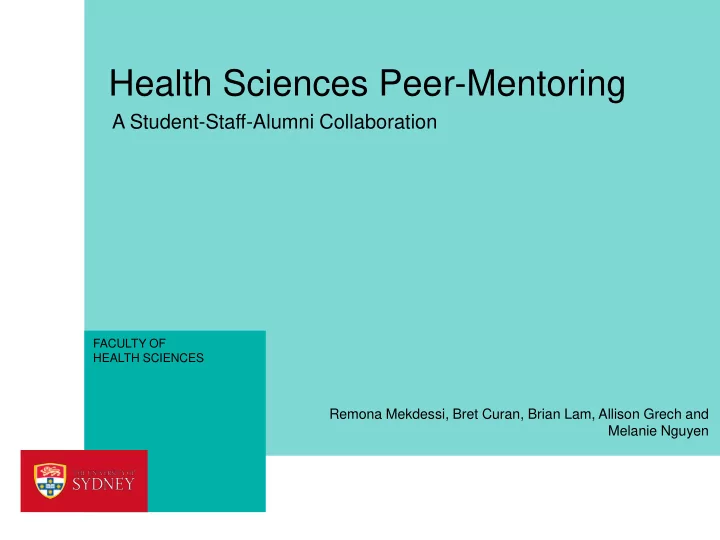

Health Sciences Peer-Mentoring A Student-Staff-Alumni Collaboration FACULTY OF HEALTH SCIENCES Remona Mekdessi, Bret Curan, Brian Lam, Allison Grech and Melanie Nguyen
Acknowledgements and Outline This project was supported by Widening Participation grant funding from The University of Sydney Social Inclusion Unit. Presentation Outline › What is the Mentoring Program? › Evaluating the program › Strategies for overcoming challenges
What does the Mentoring Program look like? 2011 Semester 2 • Mentor recruitment 2012 January – February • Mentor training • Mentee recruitment • Organising mentoring teams (2 mentors, 6-8 mentees) • 2012: Allocated into groups based on majors • 2013: Sign up to a timetabled session • Mentoring Orientation Day (aka “Amazing Race Day”)
Mentoring Orientation Day (Amazing Race Day) 4
What does the Mentoring Program look like? 2011 Semester 2 • Mentor recruitment 2012 January – February • Mentor training + Mentee recruitment • Mentoring Orientation Day (aka “Amazing Race Day”) 2012 Semester 1 • Mentoring sessions • What is uni? • Assessments • Majors and Electives • Exam study and referencing workshops 2012 Semester 2 • Mentors and Alumni evening • BBQ & movie evening • Mentors recruitment for subsequent year
Evaluating the Mentoring Program › Surveyed all first year students (not just mentees) at the beginning of semesters 1 and 2. › Compared the change in sense of belongingness, teamwork skills and appreciation for diversity in mentees and non-mentees over semester 1, 2012. - No significant difference. - BUT! Students were identifying as mentees even though they had not attended a mentoring session... 6
Evaluating the Mentoring Program › Examined the correlation between number of mentoring sessions attended and the following factors: - Sense of belongingness: r S =0.50, p <0.001 - Appreciation for diversity: r S =0.63, p <0.001 - Teamwork skills: r S =0.53, p <0.001 - Feeling settled at uni: r S =0.70, p <0.001 - Feeling reassured: r S =0.57, p <0.001 - Feeling motivated: r S =0.59, p <0.001 7
Mentoring Success and Sustainability “...[T]he program last year really helped me settle into uni life and I would love to do the same for school leavers next year. My partner and I were... in the same team on the amazing race day and have been friends ever since!” http://sydney.edu.au/health-sciences/current-students/belong-mentoring.shtml “I would like to become a mentor to help out the mentee's the way my mentor's helped me... I would love to let them know of my experiences and help guide them throughout their first year to make most out of their experience.” 8
CHALLENGES Mentees sign up and don’t attend. Given the benefits of mentoring, 1. how can we support these people? 2. One challenge was timetabling so we used timetabling schedule this year. Which method is better – assigning to groups or signing up using a timetable? We provide academic support through workshops – some discussion 3. that this is not part of mentoring and may confuse the relationship. Do you think mentoring should include that kind of academic support? 4. eCommunity for online mentoring was not used as well as we would like. Strategies? 9
10
Recommend
More recommend